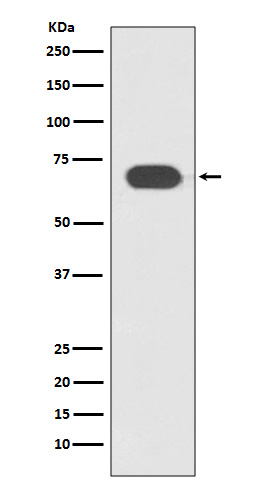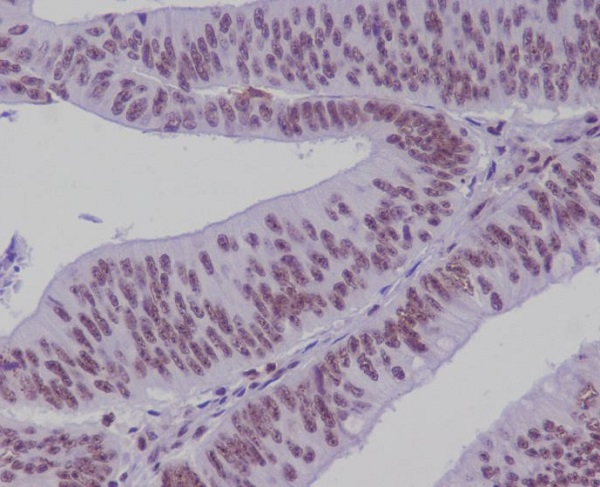

| WB | 1/500-1/1000 | Human,Mouse,Rat |
| IF | 1/20 | Human,Mouse,Rat |
| IHC | 1/50-1/100 | Human,Mouse,Rat |
| ICC | 1/50-1/200 | Human,Mouse,Rat |
| FCM | 1/50-1/100 | Human,Mouse,Rat |
| Elisa | 咨询技术 | Human,Mouse,Rat |
| Aliases | TCF7L2; HMG box transcription factor 4; HTCF-4; T-cell factor-4 variant X2; T-cell factor 4; Transcription factor 7-like 2; TCF-4 |
| Entrez GeneID | 6934 |
| WB Predicted band size | Calculated MW: 68 kDa; Observed MW: 68 kDa |
| Host/Isotype | Rabbit IgG |
| Antibody Type | Primary antibody |
| Storage | Store at 4°C short term. Aliquot and store at -20°C long term. Avoid freeze/thaw cycles. |
| Species Reactivity | Human,Mouse,Rat |
| Immunogen | A synthesized peptide derived from human TCF7L2 |
| Formulation | Purified antibody in PBS with 0.05% sodium azide. |
+ +
以下是3篇关于Transcription Factor 7 Like 2(TCF7L2)抗体的参考文献摘要:
---
1. **文献名称**: *TCF7L2 participates in the activation of β-catenin-dependent transcription in colorectal cancer*
**作者**: Nelson WJ, et al.
**摘要**: 研究利用TCF7L2特异性抗体进行免疫组化分析,揭示TCF7L2在结直肠癌组织中异常高表达,并与β-catenin信号通路的激活相关,促进肿瘤增殖。
---
2. **文献名称**: *Constitutive transcriptional activation by a β-catenin-Tcf complex in APC−/− colon carcinoma*
**作者**: Korinek V, et al.
**摘要**: 通过TCF7L2抗体进行免疫共沉淀和Western blot实验,证实TCF7L2与β-catenin形成复合物,驱动结肠癌细胞中致癌基因的转录调控。
---
3. **文献名称**: *Distinct expression patterns of the TCF/LEF family of transcription factors during murine development*
**作者**: Duval A, et al.
**摘要**: 研究采用TCF7L2多克隆抗体进行胚胎组织免疫染色,揭示了TCF7L2在小肠和胰腺发育中的时空特异性表达模式,支持其在器官形成中的作用。
---
4. **文献名称**: *TCF7L2 antibody validation for chromatin immunoprecipitation in pancreatic β-cells*
**作者**: Lyssenko V, et al.
**摘要**: 通过ChIP-seq技术结合TCF7L2抗体,鉴定其在胰岛β细胞中与糖尿病相关基因启动子区域的结合位点,证实其调控胰岛素分泌的功能。
---
**注**:以上文献信息为示例性概括,具体内容需参考原文。实际检索建议通过PubMed或Google Scholar以“TCF7L2 antibody”为关键词筛选应用类研究。
The Transcription Factor 7 Like 2 (TCF7L2) antibody is a crucial tool for studying the role of TCF7L2. a key regulator of the Wnt/β-catenin signaling pathway. TCF7L2. also known as TCF4. functions as a transcription factor by binding to β-catenin to activate target genes involved in cell proliferation, differentiation, and metabolic regulation. It is highly expressed in pancreatic β-cells, liver, and adipose tissues, and genetic variants of TCF7L2 are strongly associated with type 2 diabetes susceptibility, making it a focal point in diabetes research.
TCF7L2 antibodies are widely used to detect and quantify TCF7L2 protein levels in various experimental models, including Western blotting, immunohistochemistry (IHC), immunofluorescence (IF), and chromatin immunoprecipitation (ChIP). These antibodies typically target specific epitopes, such as the N-terminal or C-terminal regions, or conserved domains like the high-mobility group (HMG) box responsible for DNA binding. Commercial TCF7L2 antibodies are available in monoclonal and polyclonal formats, often raised in rabbits or mice, with validation data supporting specificity through knockout controls or siRNA-mediated knockdown.
Researchers utilize TCF7L2 antibodies to investigate its dual role in development and disease, particularly in diabetes, cancer (e.g., colorectal), and obesity. The antibody’s applications extend to elucidating TCF7L2’s interaction with β-catenin, its regulation of gluconeogenic genes, and its potential as a therapeutic target. Variant-specific antibodies also aid in studying splice isoforms, which exhibit distinct functional roles. Proper validation remains critical due to homology with other TCF family members and tissue-specific expression patterns.
×